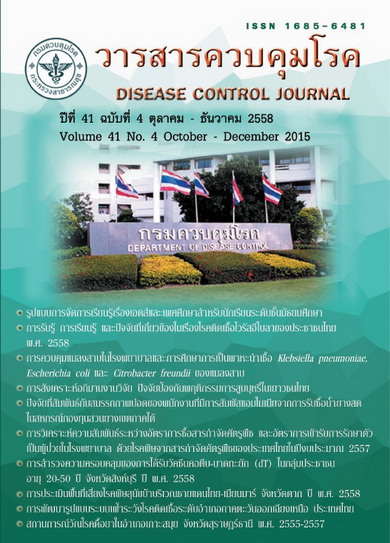Development model of communicable disease surveillance system at a district level in the Northeastern Thailand
DOI:
https://doi.org/10.14456//dcj.2015.9Keywords:
model development, communicable surveillance systemAbstract
This participatory action research aimed to improve communicable disease surveillance system at district level in a province in the Northeastern by selecting to study purposively 1 community hospital 17 health centers, 2 district health office, and 17 sub-district administrative organizations; a total was 37 health facilities. There were 60 local officers from those places by purposive sampling. Quantitative data were collected through reviewing medical records. Qualitative data were obtained through focus groups and in-depth interviews, and analyzed by qualitative content analysis. Using quantitative data was evaluated by descriptive statistics and proportional differences before and after intervention. The results of the early stage of the surveillance system showed that health personnel had insufficient knowledge of surveillance. They used less case definition on reporting disease. The information in surveillance system could explain less disease situations in local area. The sensitivities were also low. Then, local surveillance personnel and research team participated to improve communicable disease surveillance system in district level to solve the problems. They could improve surveillance system better (sensitivity, positive predictive value, representativeness, timeliness and data quality). Qualitative data supported quantitative data. This study offered new guidelines of communicable disease surveillance system in district, cooperative works process, cooperative equitation, reality reflection and cooperative discussion for being proud of self-reflection. Assessment of satisfaction participants found that a satisfactory was high level.
Downloads
References
2. Langmuir, D. The surveillance of communicable diseases of national importance. The New England Journal of Medicine 1963;268:182-92.
3. Scribner S, Franco L, Ram S. Improving surveillance systems: Building support for implementation. Washington, DC: U.S. Agency for international development; 2005.
4. Thaewnongiew K, Sriamporn S, Nilvarangkul K, Rangsin R, Phitak P, Sarakarn P. The surveillance system in health centers in the Northeast Thailand. Jpn J Infect Dis 2009;62:444-9.
5. Tan F, Chang K, Tseng F, Lin W. Evaluation of the national notifiable disease surveillance system in Taiwan: An example of varicella reporting. Vaccine 2007;25:2630-33.
6. Klein S, Bosman A. Completeness of malaria notification in the Netherlands 1995-2003 assessed by capture-recapture method. Euro Surveill 2005;10:244-6.
7. เอมอร สุทธิสา, พรนภา ศุกรเวทย์ศิริ, พงษ์เดช สารการ. โรควัณโรค จังหวัดมหาสารคาม พ.ศ. 2546-2547. วารสารวิชาการสาธารณสุข 2550;16:275-83.
8. Standaert S, Lefkowitz L, Horan J, Hutcheson R, Schaffner W. The reporting of communicable diseases: a controlled study of Neisseria meningitides and Haemophilus influenza infections. Clin Infect Dis 1995;20:30-6.
9. นันทนา สุขมา. การศึกษาการลงรหัสโรคผู้ป่วยนอกของสถานีอนามัยทั่วไป และสถานีอนามัยขนาดใหญ่ : กรณีศึกษาสถานีอนามัยในจังหวัดขอนแก่น [วิทยานิพนธ์ปริญญาสาธารณสุขศาสตร์มหาบัณฑิต]. ขอนแก่น: มหาวิทยาลัยขอนแก่น; 2544.
10. พวงเพชร เมืองสนธิ์, จิตติมา พานิชกิจ, รัชนี นันทนุช, กฤษพงษ์ สุบันนารถ, ทิพยรัตน์ สิงห์ทอง, ศุจินันท์ ตรีเดช, และคณะ. การประเมินระบบเฝ้าระวังโรคจากการประกอบอาชีพและสิ่งแวดล้อม. ขอนแก่น: โรงพิมพ์คลังนานาธรรม; 2552.
11. Lyons S, Zidouh A, Ali Bejaoui M, Abdallah M, Amine S, Garbouj M, et al. Implications of the international health regulations (2005) for communicable disease surveillance system: Tunisia’s experience. Public Health 2007;121:690-5.
12. สำนักระบาดวิทยา กรมควบคุมโรค กระทรวงสาธารณสุข. การเฝ้าระวังโรคติดเชื้อประเทศไทย. กรุงเทพมหานคร: โรงพิมพ์องค์การรับส่งสินค้าและพัสดุภัณฑ์; 2546.
13. อิสระ วิริยะบุญญา, เด่นชัย สรจิต, ละมัย ภูริบัญชา. การวิจัยเชิงปฏิบัติการ: การพัฒนาระบบเฝ้าระวังโรคอุบัติใหม่โดยใช้การรายงานตามกลุ่มอาการ (SR-506 Form). การสัมมนาระบาดวิทยาแห่งชาติ ครั้งที่ 15; วันที่ 22-24 พฤษภาคม 2545; โรงแรมแอมบาสเดอร์, กรุงเทพมหานคร: 2545. หน้า 45.
14. Webb C. Action research: philosophy, methods and personal experiences. Journal of Advance Nursing 1989;14:403-10.
15. Centers for Disease Control and Prevention. Updated guidelines for evaluating public health surveillance systems. Morbidity and Mortality Weekly Report 2001;50:1-35.
16. Elo S, Kyngas H. The qualitative content analysis process. Journal of Advanced Nursing 2008;62: 107-15.
17. Guba G, Lincoln S. Effective evaluation. San Francisco: Jossey-Bass; 1981.
18. Lewin. Action research and minority problems. Journal of Social 1946;2:34-6.
19. Nilvarangkul K, Terence V McCann, Rungreangkulkij S, Wongprom J. Enhancing a Health-Related Quality-of-Life Model for Laotian migrant workers in Thailand. Qual Health Res 2012;22: 189-98.
20. Jhung M, Budnitz D, Mendelsohn A, Weidenbach K, Nelson T, Pollock D. Evaluation and overview of the national electronic injury surveillance system cooperative adverse drug event surveillance project. Medical Care 2007;45:96-102.
21. อัมพรพรรณ ธีรานุตร. การพัฒนารูปแบบการบริการระยะเปลี่ยนผ่านสำหรับผู้สูงอายุที่เจ็บป่วยเรื้อรัง [วิทยานิพนธ์ปริญญาปรัชญาดุษฎีบัณฑิต]. ขอนแก่น: มหาวิทยาลัยขอนแก่น; 2548.
Downloads
Published
How to Cite
Issue
Section
License
Articles published in the Disease Control Journal are considered as academic work, research or analysis of the personal opinion of the authors, not the opinion of the Thailand Department of Disease Control or editorial team. The authors must be responsible for their articles.






